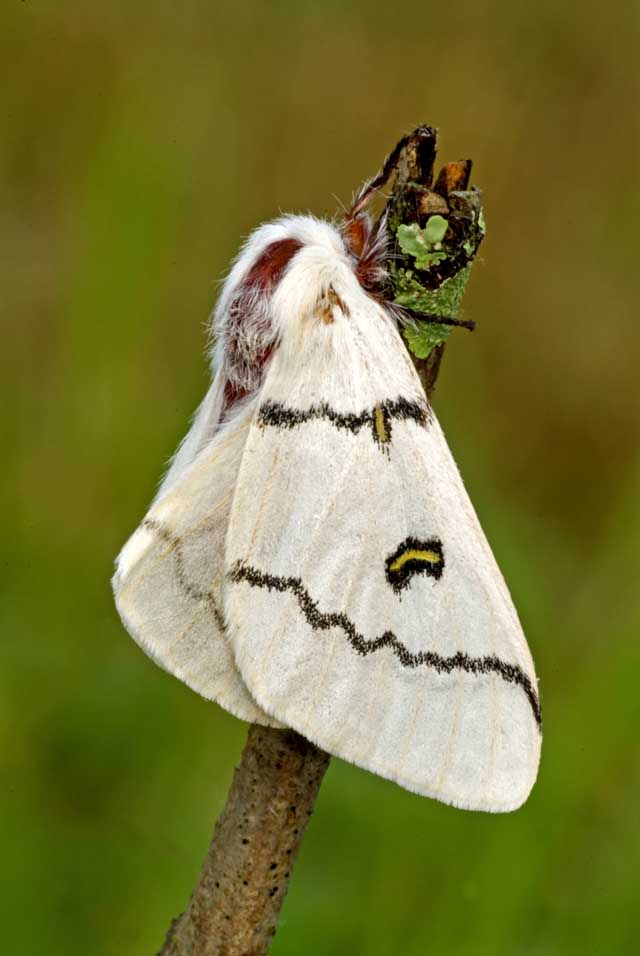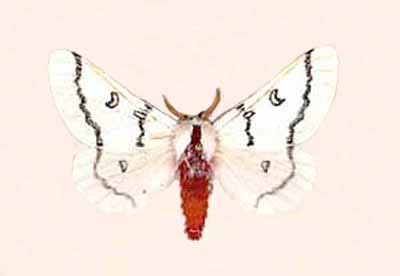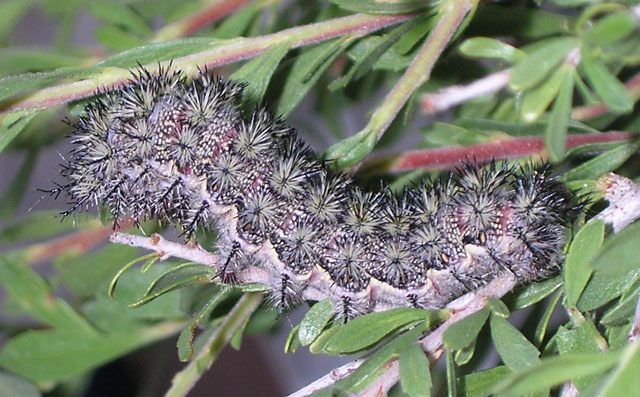Hemileuca neumoegeni
Hemileuca neumoegeni
(Henry Edwards, 1881)
Euleucophaeus Neumoegeni

Hemileuca neumoegeni male, Arizona,
courtesy/copyright Leroy Simon.
TAXONOMY:
Superfamily: Bombycoidea, Latreille, 1802
Family: Saturniidae, Boisduval, [1837] 1834
Subfamily: Hemileucinae, Grote & Robinson, 1866
Tribe: Hemileucini, Grote & Robinson, 1866
Genus: Hemileuca, Walker, 1855 |
MIDI MUSIC
"Someone to Watch Over Me"
copyright C. Odenkirk
ON.OFF
<bgsound src="watch.mid" LOOP=FOREVER>
|
DISTRIBUTION:
Neumoegen's buckmoth,
Hemileuca neumoegeni
(wingspan: males: 45-55mm; females: 58-64mm), flies in desert scrub
in southeastern California, southern Nevada, northern Arizona,
southwestern and eastern Utah, and western Colorado.
"Identification: Abdomen is mostly red and the
upperside of wings is pearly white. Forewing has black zigzag
submarginal and submedian lines, and a crescent-shaped cell spot.
The submedian line may have a small oval spot bisecting it.
Hindwing has a pale submarginal line and a small spot. "
FLIGHT TIMES AND PREFERRED FOOD PLANTS:
This species
flies from August-October.
Squawbush (Rhus trilobata),
desert almond (Prunus fasciculata), and Apache plume
(Falluga paradoxa) are the primary larval hosts.

Hemileuca neumoegeni. Photo by William A. Harding.
ECLOSION, SCENTING AND MATING:
Adults emerge in late
morning and mate after dark.
EGGS, LARVAE, COCOONS AND PUPAE:
Females lay eggs in rings around host plant stems, and the eggs
overwinter and hatch in April. Young caterpillars feed gregariously
while older ones feed alone. Older caterpillars hide during the day
at the base of the plant and feed at night. Cocoons are spun in plant
debris or in loose soil.

Hemileuca neumoegeni on desert almond,
Prunus fasciculatum, (image rotated)
McCullough Mountains
near Searchlight,
Nevada, May 25, 2004, courtesy of Dave Wikle.
Larval Food Plants
Listed below are primary food plant(s) and alternate food plants listed in Stephen E.
Stone's Foodplants of World Saturniidae. It is hoped that this
alphabetical listing followed by the common name of the foodplant will
prove useful. The list is not exhaustive. Experimenting with closely
related foodplants is worthwhile.
Rhus trilobata
Prunus fasciculata.......
Falluga paradoxa
|
Squawbush
Desert almond
Apache plume
|
Return to Hemileuca Genus
Goto Canada - U. S. A. Index


